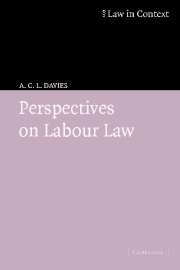Book contents
- Frontmatter
- Contents
- Preface
- Acknowledgements
- Table of statutes
- Table of statutory instruments
- Table of conventions and foreign legislation
- Table of cases
- Abbreviations
- Part I
- Part II
- 5 Who is protected by employment law?
- 6 Working time
- 7 Discrimination
- 8 Wages
- 9 Dismissal
- 10 Collective representation
- 11 Trade union membership
- 12 Industrial action
- What next?
- Index
12 - Industrial action
Published online by Cambridge University Press: 06 January 2010
- Frontmatter
- Contents
- Preface
- Acknowledgements
- Table of statutes
- Table of statutory instruments
- Table of conventions and foreign legislation
- Table of cases
- Abbreviations
- Part I
- Part II
- 5 Who is protected by employment law?
- 6 Working time
- 7 Discrimination
- 8 Wages
- 9 Dismissal
- 10 Collective representation
- 11 Trade union membership
- 12 Industrial action
- What next?
- Index
Summary
Strikes are not very common in the UK. The ‘strike rate’ is defined by statisticians as the number of working days lost through strike action per 1000 employees. The most recent figure for the UK is for the year 2000, in which 20 working days per 1000 employees were lost. In general, the strike rate for the UK has been falling, from 34 in 1991 to 10 in 1999, though there are occasional ‘blips’: a large dispute in 1996 took the average up to 55. It is not yet clear whether the figure of 20 for 2000 is a similar ‘blip’, or the start of a new upward trend. Further proof that the UK's strike rate has declined to a very low level is provided by the WERS. This study collects data by asking managers whether or not any industrial action has taken place in their workplace during the last year. In 1980, a quarter of workplaces reported some kind of industrial action (including non-strike action). In 1990, the figure had fallen to 13% and by 1998 it was just 2%. The figures for strike action were 11% in 1990 falling to 1% in 1998. Nevertheless, industrial action is probably the most controversial topic in labour law. Most people have experienced the disruption industrial action can cause: perhaps your travel plans have been affected by a strike of train drivers or air traffic controllers, for example. And it provokes very different reactions from rights theorists and economists.
- Type
- Chapter
- Information
- Perspectives on Labour Law , pp. 218 - 237Publisher: Cambridge University PressPrint publication year: 2004

